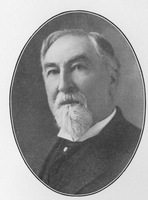 | Back to e-WV
| Back to e-WV
 The West Virginia Encyclopedia
The West Virginia Encyclopedia
 | Back to e-WV
| Back to e-WV
 The West Virginia Encyclopedia
The West Virginia Encyclopedia

U.S. Senator Nathan Bay Scott (December 18, 1842-January 2, 1924) was born in Guernsey County, Ohio, west of Wheeling. He worked in a general store as a boy and in 1859, traveled to Leavenworth, Kansas, then worked as an ox driver from Leavenworth to Denver. Returning to Ohio, he enlisted in the Union army about 1863.
From these modest beginnings Scott rose to become one of West Virginia’s four ‘‘richest and most powerful men by 1900,’’ according to historian John Alexander Williams. At the end of the Civil War, Scott entered the glass industry in Bellaire, Ohio, and he made his fortune in business and banking. He moved to neighboring Wheeling in 1875, becoming in 1876 the president of Central Glass Company. He later served as an officer in banks in Wheeling and Washington, and invested in coal and timber in Logan and Mingo counties in West Virginia’s southern coalfields. Scott was a founder of the Dollar Savings & Trust Company, a predecessor of WesBanco.
Scott entered West Virginia politics when he was elected to the Wheeling City Council in 1880. Two years later, he was elected as a Republican to the state Senate, serving two terms, 1883–91. He became a member of the Republican National Committee in 1888, serving 24 years. In 1898, Scott was elected to the U.S. Senate and reelected in 1904, but he lost the Republican nomination in 1910 in a bitter inter-party rivalry.
In the U.S. Senate, Scott was a close ally of Sen. Stephen B. Elkins, the leader of West Virginia Republicans until his 1911 death. As it happened, Elkins died in office just as Scott’s second term was expiring, in an era when U.S. senators were elected by the state legislature. The prospect of the Democratic legislature replacing two Republican U.S. senators at once led to one of the most notorious standoffs in West Virginia politics, as Republican state senators first hid in the governor’s office and then fled the state to prevent a vote by denying a quorum.
After leaving the Senate, Scott lived the rest of his life as a banker in Washington where he died.